Related Research Articles

The Kenya African National Union (KANU) is a Kenyan political party that ruled for nearly 40 years after Kenya's independence from British colonial rule in 1963 until its electoral loss in 2002. It was known as Kenya African Union (KAU) from 1944 but due to pressure from the colonial government, KAU changed its name to Kenya African Study Union (KASU) mainly because all political parties were banned in 1939 following the start of the Second World War. In 1946 KASU rebranded itself into KAU following the resignation of Harry Thuku as president due to internal differences between the moderates who wanted peaceful negotiations and the militants who wanted to use force, the latter forming the Aanake a forty, which later became the Mau Mau. His post was then occupied by James Gichuru, who stepped down for Jomo Kenyatta in 1947 as president of KAU. The KAU was banned by the colonial government from 1952 to 1960. It was re-established by James Gichuru in 1960 and renamed KANU on 14 May 1960 after a merger with Tom Mboya's Kenya Independence Movement.
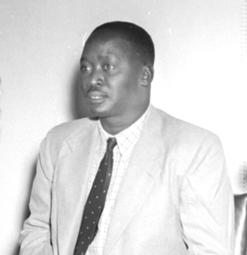
Jaramogi Ajuma Oginga Odinga was a Kenyan politician who became a prominent figure in Kenya's struggle for independence. He served as Kenya's first vice-president, and thereafter as opposition leader. Odinga's son Raila Odinga is a former prime minister, and another son, Oburu Odinga, is a former assistant minister in the Ministry of Finance.
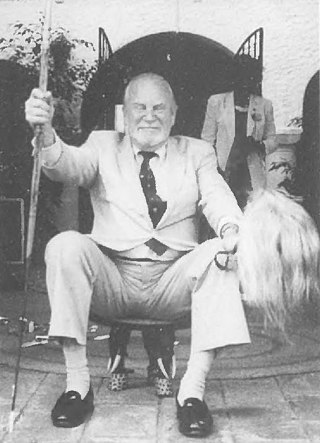
Smith Hempstone was a journalist, author, and the United States ambassador to Kenya from 1989 to 1993. He was a vocal proponent of democracy, advocating free elections for Kenya.
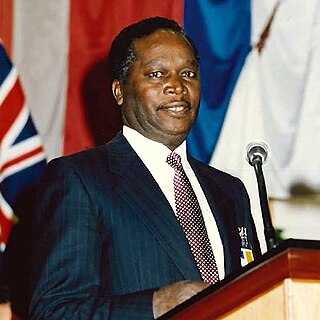
Nicholas Kipyator Kiprono arap Biwott was a Kenyan businessman, politician, and philanthropist, who worked in the governments of the fathers of Kenyan independence, Jomo Kenyatta and Daniel arap Moi. He held eight senior civil servant and ministerial positions that included Minister of State (1979–82), Minister of Energy (1963), Minister of East African and Regional Co-operation (1998–99) and Minister of Regional Development, Science, and Technology (1982).

John Robert Ouko was a Kenyan politician who served two spells as Foreign Minister of Kenya: from 1979 to 1983 and from 1988 to 1990. Ouko served in the government of Kenya from the colonial period through the presidencies of Jomo Kenyatta and Daniel arap Moi. He was a member of the National Assembly for Kisumu and a cabinet minister, rising to the post of Minister of Foreign Affairs and International Cooperation by 1990. On 13 February 1990, Ouko was found murdered in Muhoroni; the assassination, perhaps the most intriguing in Kenyan history, remains unsolved.
Jonah Anguka is a Kenyan author and former District Commissioner at Nakuru, known as the only person to date to have been tried for the murder of Dr Robert Ouko, Kenya's Minister of Foreign Affairs, who was shot dead on 13 February 1990.

Kisumu County is one of 47 counties in the Republic of Kenya. Its borders follow those of the original Kisumu District, one of the former administrative districts of the former Nyanza Province in western Kenya. Its headquarters is Kisumu City which is the third largest city in Kenya after the capital Nairobi and the coastal city of Mombasa. It has a population of 1,155,574. The land area of Kisumu County totals 2085.9 km2.

Corruption in the government of Kenya has a history which spans the era of the founding president Jomo Kenyatta, to Daniel arap Moi's KANU, Mwai Kibaki's PNU governments. President Uhuru Kenyatta's Jubilee Party government, and the current William Ruto's Kenya Kwanza administration has also been riddled with massive cases of graft, topping in the list of corrupt presitents in Africa

George Musengi Saitoti, E.G.H. was a Kenyan politician, businessman and American- and British-trained economist, mathematician and development policy thinker.
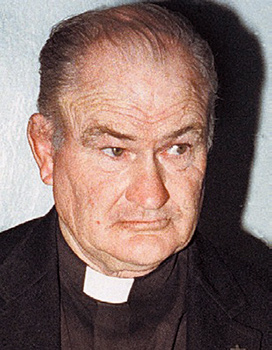
John Anthony Kaiser was a Roman Catholic priest and Mill Hill father from Perham, Minnesota, US, who was assassinated near his mission at Morendat, near Naivasha, Rift Valley Province, Kenya.
Hezekiah Oyugi was head of internal security for the Republic of Kenya in 1990 when Foreign Minister Robert Ouko was murdered. Both he and energy minister Nicholas Biwott were named as "principal suspects" in the crime, by a British investigator during a commission of inquiry. Both were arrested but freed after two weeks for lack of evidence.

Bethwell Allan Ogot is a Kenyan historian and eminent African scholar who specialises in African history, research methods and theory. One of his works starts by saying that "to tell the story of a past so as to portray an inevitable destiny is, for humankind, a need as universal as tool-making. To that extent, we may say that a human being is, by nature, historicus.
Eisha Stephen Atieno Odhiambo (1945 – 25 February 2009)) was a Kenyan academic born in Muhoroni, known for his contributions to the understanding of dangers inherent in politics of knowledge and sociology of power. Dr Odhiambo was professor of history at Rice University in the United States, where he led in the study of cultures. He was educated at Makerere University in Uganda and the University of Nairobi in Kenya.
Dr. Zachary T. Onyonka (1939–1996) was a Kenyan politician who served his country as a cabinet minister from 1969 to 1996 in various ministries. He served in Education, Economic Planning & Development and Trade and Foreign Affairs, Planning and National Development. Well Known within the Kisii community, he was always at loggerheads with then Nyaribari Chache MP Simeon Nyachae until he died. Onyonka was elected to parliament in the 1969 elections from Kitutu West Constituency when he trounced the first cabinet minister from Kisii, Lawrence Sagini Ndemo. He was the youngest MP at about 27 years. He retained his parliamentary seat until his death. He was famous for leading an anti-Nyachae crusade in Kisii after he was released from Kodiaga prison in Kisumu. He had been arrested and charged with murder following a fatal shooting incident involving his bodyguards and a voter in then Kitutu West constituency campaigns. Ouru Ndege was shot dead after he attempted to attack Dr. Onyonka with a knife during the stormy 1983 campaigns along Kisii-Migori road junction. His rival, John Bosco Mboga had just addressed his supporters in the area and when Onyonka, who was a cabinet minister in President Moi's government arrived, Ndege attempted to stab him with a sword leading to the minister's bodyguards shooting him to death. Onyonka and his guards did not have a car at the time of the shooting. He was rescued by a matatu driver, Joseph Moya Nyambariga, from Botoro area in Bomorenda, Bonchari. He drove the sieged minister in his matatu, christened Bolingo Na Ngai Express to safety at Suneka Chief's camp. He was arrested soon after and locked up in Kisumu awaiting trial on murder charges. The prosecution was unable to prove the case against him and in 1984, Onyonka was set free. He had won the hotly contested election in absentia and after two years in the cold, Moi appointed him Minister for Foreign Affairs. Before the 1988 elections, Onyonka led a group of politicians from Kisii dubbed the Four Os. This stands for Onyonka, Obure Omanga and Onyancha to launch the famous "Kebirigo Declaration" in which Nyachae was denounced. The Kebirigo declaration was a strong political ideology that stood for independence of each constituency in Kisii against manipulation from Nyachae. At that time, it had become increasingly evident that Nyachae who was a powerful civil servant was planning to plunge into active politics. Onyonka alleged that Nyachae had embarked on a series of secret campaigns, recruiting candidates against incumbent MPs so that he could make it to parliament with a clean slate of leaders, if he was cleared by KANU to run for elective seat. The Kebirigo declaration was therefore meant to assert the authority and legitimacy of each member of parliament from Kisii and also sought to reject the political dominion from Nyaribari, Nyachae's home constituency. After Onyonka's death in 1996, he was succeeded by Jimmy Nuru Angwenyi as MP for Kitutu Chache. His son Richard Momoima Onyonka, later dethroned Angwenyi to become the area MP. After the 2013 electoral review, Kitutu Chache was divided into two constituencies, North and South (Mosocho).
Gideon Musyoka Ndambuki is a Kenyan politician. He has been the Kaiti Constituency MP since 1997 when the constituency was established, and was a minister between 1998 and 2002. At the 1997 and 2002 elections he won the seat representing the KANU party, but represented the Orange Democratic Movement-Kenya at the 2007 Kenyan parliamentary election. He unsuccessfully vied for the Makueni County Senate seat during Wiper Democratic Party nominations in the run-up to the 2013 General Elections in Kenya. Educated in the US, he was an employee of the Commercial Bank of Africa in the 1980s, and more controversially, Managing Director of Trade Bank between 1986 and its collapse in 1993.

Wilson Ndolo Ayah was a Kenyan politician. He served as Foreign Minister from 1990 to 1993 during Kenya's return to a multi-party system of governance. Wilson Ndolo Ayah served in the government of Daniel Arap Moi as minister from 18 August 1987 when he was first appointed Minister for Research Science and Technology. He was also a beneficiary of the Kennedy Airlifts.
Grace Monica Akech Onyango, popularly known as Nya'Bungu, was a Kenyan politician. She achieved several firsts in post-independence Kenyan politics, as the first female to climb up the ranks of the political system, defying cultural barriers. She was the first Kenyan female mayor, after she replaced Mathias Ondiek as the Mayor of Kisumu in 1965. She was also the first female Member of Parliament in post-independence Kenya after she was elected to represent Kisumu Town Constituency in 1969. In Parliament, Onyango was the first woman to sit in the speaker's chair as temporary deputy speaker, and served as Deputy Speaker from 1979 to 1984. Her political career ended after she lost her parliamentary seat in 1984. Onyango also served as the first female secretary-general of the Luo Union.
George Luchiri Wajackoyah is a legal practitioner based in Nairobi, Kenya, and an independent political campaigner. Wajackoyah was also a presidential candidate in Kenya's 2022 general election held on 9 August 2022. He ran under the Roots Party of Kenya, which supports the legalisation of bhang in Kenya.
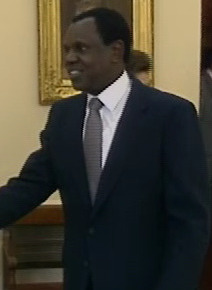
Denis Daudi Afande (1937-2021) was a long-serving career Kenyan diplomat who held eight ambassadorial positions during his career. A consummate Diplomat, Afande joined the public service at Kenya's Independence (1964). He served as Kenya's Deputy Chief of Protocol under founding President Jomo Kenyatta and chief of protocol under President Danial arap Moi. He later served as Kenya's ambassador to Washington (1988-1994), the United Nations Mission in Geneva, Switzerland, the United Kingdom, Germany, France, Egypt and Saudi Arabia.
References
- ↑ Parliament Launches Fresh Probe into Ouko Murder. Publication: Asia Africa Intelligence Wire Publication Date: 27-MAR-03 http://www.accessmylibrary.com/coms2/summary_0286-22817845_ITM
- ↑ A minister's death received with disbelief http://www.eastandard.net/InsidePage.php?id=1144006539&cid=259&%5B%5D
- ↑ "Parliamentary Select Committee Report".
- ↑ "Parliamentary Select Committee Report".
- ↑ "Parliamentary Select Committee Report".
- ↑ "Parliamentary Select Committee Report".
- ↑ "Parliamentary Select Committee Report".
- ↑ "Parliamentary Select Committee Report".
- ↑ "Parliamentary Select Committee Report".
- ↑ "Parliamentary Select Committee Report".
- ↑ "Parliamentary Select Committee Report".
- ↑ "Lest we Forget: The Faces of Impunity in Kenya". KHRC.
- ↑ "Lest we Forget: The Faces of Impunity in Kenya". KHRC.
- ↑ Parliament Launches Fresh Probe Into Ouko Murder. Publication: Asia Africa Intelligence Wire Publication Date: 27-MAR-03
- ↑ A minister's death received with disbelief
- ↑ "Parliamentary Select Committee Report".
- ↑ "Lest we Forget: The Faces of Impunity in Kenya". KHRC.
- ↑ "Troons final report para 290".
- ↑ "Who killed Dr Robert Ouko?..and Why?". murder at Got Alila. WPMS/INCA/CitizenTV. Archived from the original on 22 April 2017. Retrieved 25 April 2017.
- ↑ "Kenya Police Further Investigations pages 11,12 and 13". Kenya Police.{